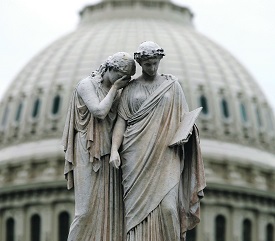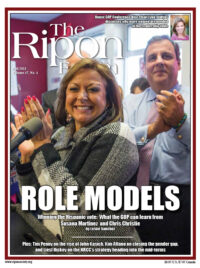 As with most American political trends, any single factor is seldom the exclusive cause. While the 24/7 news cycle and increasing use of social media provide a fragmented environment for political communication, one of the principal reasons for the present rise of special interest groups’ influence on the political process is our monumentally irrational campaign financing system.
As with most American political trends, any single factor is seldom the exclusive cause. While the 24/7 news cycle and increasing use of social media provide a fragmented environment for political communication, one of the principal reasons for the present rise of special interest groups’ influence on the political process is our monumentally irrational campaign financing system.
The Federal Election Campaign Act, as amended by the Bipartisan Campaign Reform Act and in conjunction with state campaign finance rules, has made it much more difficult for political party organizations to raise funds and support candidates than any other groups. Super PACS, tea party organizations, trade associations, unions and wealthy individuals can raise and/or spend money outside of many of the legal limits placed on political parties.
The restrictions imposed exclusively on party organizations have resulted in campaign support that otherwise would have gone to the party being sent instead to independent groups or spent independently. If we understand the essential role of healthy parties in our political system, then at the very least one of the goals of campaign finance regulation should be preserving the vitality of our parties.
Political parties, as we know them, are an American invention. Parties were not accidents of history. Our earliest political leaders realized that they were essential in bringing order to America’s tripartite form of government. Thomas Jefferson and James Madison devised them as means of changing the policy directions of government. Andrew Jackson and Martin Van Buren revised them as a means of expanding popular participation in government.
Since the earliest days of our Republic, they have, albeit imperfectly, continued to serve these ends. Parties are the only broad-based, multi-interested organizations in this country that can nominate candidates for office, mobilize popular support behind them, and organize those elected into a government.
If we understand the essential role of healthy parties in our political system, then at the very least one of the goals of campaign finance regulation should be preserving the vitality of our parties.
Unlike special interest groups, parties must appeal to majorities in the electorate if they are to win; and unlike single-candidate organizations, they must win many races if they are to govern. Parties, moreover, give coherence to American politics. We have a constitutional system and a political culture dominated by dis-unifying forces – separated powers, federalism, pluralism, and individualism. Parties have been a unifying force in this system, cutting across the branches and levels of government as well as across voting blocs to aggregate interests, build coalitions and make mass democracy possible.
Individual candidate campaigns and special interest-based groups do not provide the men and women they support with wider programs or principles required to govern. Single-issue groups lead to fragmented government, the neglect of broader policy needs, and the neglect of needs of citizens not represented by groups. Broad-based political parties, on the other hand, can compromise and incorporate the wishes of a wide range of citizens in programs that encompass a multitude of issues and stretch across a greater timespan than a term of office. They can marshal the resources and develop the strategy to recruit, train, support and guide a succession of individuals to advance those programs during their terms in office. They are able to put forward a broad panel of spokespersons in defense of their programs, informing and educating the citizenry in a debate that extends well beyond the short-range electoral prospects of particular candidates.
 In short, only political parties can provide us with the cohesion, continuity and accountability necessary to make our democracy work. Political parties are the only broad-based, popular intermediaries between the people and their government. Voters use them to steer government in directions they wish it to go. When political parties work, government works. When they do not, government falters and drifts – witness Washington today.
In short, only political parties can provide us with the cohesion, continuity and accountability necessary to make our democracy work. Political parties are the only broad-based, popular intermediaries between the people and their government. Voters use them to steer government in directions they wish it to go. When political parties work, government works. When they do not, government falters and drifts – witness Washington today.
Our present failure of governance in regular order is a failure rooted in the corrosion of political party power. Congressional and party leadership can no longer provide or withhold a significant tool of political success – money. Special interests do not occupy a legal level-playing field with political parties, but a superior legal position unbound by most campaign finance prohibitions which, when combined with their lack of responsibility to actually govern, magnify their influence.
Why does the “reform lobby” still argue to limit political parties? The only basis recognized by the Supreme Court for any restriction of political money is corruption or the appearance of corruption.
When political parties work, government works. When they do not, government falters and drifts – witness Washington today.
Political party support is not corruptive, nor does it appear to be corruptive in any reasonable interpretation of the concept. Corruption is an impairment of integrity or the exercise of improper and undue influence – the explicit exchange of contributions for votes. A political party’s financial support to its candidates does not constitute corruption. Parties and their candidates share an identity and self interest in elections – this is a symbiotic, not a corrupting, relationship. The notion that party support corrupts candidates runs counter to virtually every theory of political party functions in the United States. One of the major purposes of political parties is to sponsor candidates who represent the diverse, but coherent, ideas encompassed in party philosophy.
Parties are not the same as interest groups. For a party to function, it must speak for broader concerns, for some combination of particular claims, for some overall approach to public issues. Parties must raise money to speak and must listen to contributors, but they must listen to majorities rather than exclusively to any particular contributor or group of contributors. Listening to majorities is what we call democracy. Political parties are the most comprehensive and most effective form of political association through which ordinary Americans can influence the direction of their government. We should prize them as the cornerstones of representative democracy and work to assure their vitality.
As a source of campaign funds, American parties constitute the “cleanest” money in politics. Recognizing that political parties are large aggregators of many contributions diffuses any real or perceived undue influence that might arise from a financial contribution. Most politicians are honest. However, most are also distracted, some appear influenced, and a few may even be corrupted by the demands of fundraising. Parties are too large and too diverse to be controlled by any special interest. The old rule of sanitary engineers applies: the solution to pollution is dilution.
There is no basis in American political theory or practice for any limit on political party contributions or expenditures. Unlike Super PACs, corporations, trade groups, unions or even wealthy individuals, there is no risk of a party corrupting a candidate by giving him or her a large sum of money. The party and the candidate clearly share a common interest in the candidate winning the election, and they presumably also share a common interest on at least major questions of public policy.
To permit greater party fundraising and enable parties to fund candidates at higher levels, tamper the fragmentation of our political process. An enlarged role for parties is the most practical way to check the growing influence of narrowly based special interest organizations. RF
Mark Braden is currently Of Counsel at BakerHostetler. He previously spent ten years as Chief Counsel to the Republican National Committee.




